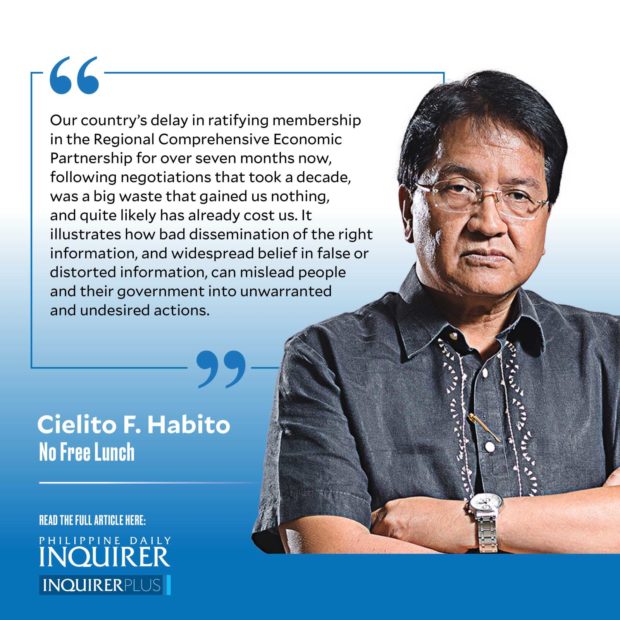Seven wasted months
Our country’s delay in ratifying membership in the Regional Comprehensive Economic Partnership (RCEP) for over seven months now, following negotiations that took a decade, was a big waste that gained us nothing, and quite likely has already cost us. It illustrates how bad dissemination of the right information, and widespread belief in false or distorted information, can mislead people and their government into unwarranted and undesired actions. (What else is new, one might ask, when the recent election outcomes were shaped precisely by the same problem?)
As the world’s largest free trade agreement (FTA) in history, RCEP is an extremely attractive trade bloc that any country seeking further economic growth opportunities through wider market access for its products wouldn’t want to miss out on. Already, Bangladesh and Hong Kong are applying to be its next members. And yet, it seems as if we don’t even want to be part of something others are so eager to join. More accurately, too many loud voices are giving all the wrong reasons to stay out of it, or delay our joining. And sadly, our politicians in the Senate allowed themselves to be swayed by those loud voices that have been creating RCEP ghosts that simply are not there.
The biggest imagined ghost is the specter that once our country ratifies RCEP, we will suddenly be flooded by an influx of imports of agricultural products from the other RCEP members—as if a closed gate would suddenly be thrown open. If those who keep saying this only cared to understand the actual situation enough, they wouldn’t be fighting RCEP tooth and nail the way they have been, as if the agreement spells death for Filipino farmers and for Philippine agriculture. This same ghost has led others to argue for a delay in RCEP’s ratification even if they claim to be for it, thinking that ratifying now will suddenly throw our import floodgates open when it will not. There are two reasons.
First, our country has already been in free trade relationships with all other RCEP members for at least 12 years now. We have long been freely trading with fellow Asean members under the Asean Trade in Goods Agreement (ATIGA) that superseded the 1992 Asean Free Trade Agreement (AFTA). We have also long had free trade relations with Australia, China, Japan, New Zealand, and South Korea by virtue of the Asean+1 bilateral FTAs with these countries; the Asean-China FTA was the last to come about, in 2010. Even so, we’ve long made exceptions for sensitive items like rice. RCEP simply consolidates these various FTAs for all 15 members, with the bonus of unified rules that make things less cumbersome for all. What changed is in how all of the five partner countries now have FTAs with one another too, whereas before RCEP, some did not. Japan, for example, had no FTAs with China, Korea, and New Zealand beforehand. But for the Asean members like us, no floodgates will suddenly open, for they have been largely open for many years.
The fact is, the positions successfully won by our RCEP negotiators actually even tightened, rather than loosened those import gates! Data from the Department of Agriculture on final negotiated positions show that RCEP would have final tariff rates higher than in ATIGA for 280 agricultural tariff lines, higher than in Asean-Australia-New Zealand for 234 lines, Asean-China for 275 lines, Asean-Korea for 273 lines, and Asean-Japan for 241 lines— a total of 1,303 more protective tariff concessions covering live animals, frozen meat, fish, vegetables, and coffee. On the other hand, only 40 tariff concessions will become looser (by 1 to 12 percentage points, with most final tariff rates reduced by less than 5 percentage points), in trade with Australia, China, Korea, and New Zealand. Nothing loosened up in our farm trade with Asean and Japan. In most cases, the slight reductions in final tariff rates will happen only in 10-15 years.
So why must RCEP scare our farmers when it turns out it would actually protect them more? And why even delay ratification, when doing so has been depriving us of far more advantages and opportunities elsewhere in the economy? Foolish? I’m still scratching my head.
cielito.habito@gmail.com





















